In Toppenish, where the individual median income is slightly more than $24,000, former Toppenish schools Superintendent John M. Cerna received more than 10 times that in unauthorized payments.
A report by Seabold Group, a Seattle-based private investigator retained by the school district, determined that Cerna received $290,425 in payments that the school board did not put into contract language, dating back to 2013 and until he was placed on administrative leave February 2023.
Cerna was fired Feb. 26, after Seabold completed its investigation.
Among the findings in the report, which is posted on the Toppenish School District’s website:
• Cerna received $56,333 in unapproved raises since the 2015-16 school year.
• He received unauthorized stipends totaling $23,600 during his tenure for training to use a firearm in an active-shooter situation in any Toppenish school.
• And received $163,500 for additional work for which there exists no explicit school board approval.
Seabold’s investigation followed a state auditor’s report that found Cerna had received illegitimate stipends, retroactive pay and vacation buyback days over two years. Cerna reimbursed the district $21,836 of the $38,295 identified in the audit report. He was not required to reimburse double raises he received in 2020 and 2021 totaling $16,459, the Seabold report said.
The state audit covered two school years from 2019-21. It said the school board did not properly oversee Cerna's pay, benefits and contract.
The board hired the Seabold Group to analyze things over a longer period and look at other areas of concern.
'A sham'
Cerna’s attorney, Bill Pickett, disputes the findings and said Cerna is preparing to file a lawsuit. He said the district authorized payments that Cerna received, and accused the district of “concocting” a report to justify firing him.
“That’s not called an investigation,” Pickett said. “That’s called a sham.”
In a letter to the law firm representing the district, attorney Brett N. Goodman said Cerna was given less than a month to prepare to defend himself in a Loudermill hearing in response to a report that was crafted over the course of a year.
"This is not just some procedural hoop the district must jump through, but rather an opportunity for Mr. Cerna to be provided his constitutional right, one with substantive grit."
In the six-page letter, which also addresses other elements of the investigation, Goodman said that every single salary increase Cerna received was approved by the board, as were the safety stipends, as shown in meeting minutes.
Cerna, Goodman said, also had two other administrators sign off on his claims for "optional day" pay, which is awarded for after-hours work.
"The fact that the district 'had no written policy, process, or definition of what an 'optional day' consisted of,' if true, is a school board issue, not a superintendent issue," Goodman wrote. "Mr. Cerna was simply following the uniform criteria for claiming the optional days in which he chose to devote his time, effort, and skill, to bettering the district and its student programs."
The letter notes that the Toppenish school district saw advances in student enrollment, student participation, extra-curricular activities and graduation rates during Cerna's tenure as superintendent. He started and participated in numerous nonprofit and community organizations that continue to benefit the Toppenish community today, the letter said.
"His record, covering 12 years of service, speaks for itself," Goodman wrote.
Cerna was interviewed twice as part of the Seabold investigation with his attorney present.
Salary
Cerna was first employed in the district in 1979 as a teacher at Toppenish Middle School, winning praise for bringing more funds to the district, strengthening sports programs and facilitating school construction projects.
He was named superintendent in May 2010, with a base salary of $128,300, 30 days of vacation time a year and the option for a “buyback” of up to 15 unused vacation days a year, as well as medical, dental and vision benefits.
It also stated that any raises would have to be approved by the school board as amendments to the contract.
Seabold’s analysis found that there were six instances where this procedure was followed: June 2011, June 2012, June 2013, January 2020, January 2021 and January 2022.
A timeline of investigations at the Toppenish School District:
However, Cerna received seven raises, including a retroactive raise, for which there was no record of board approval nor a formal amendment to Cerna’s contract, the report said.
These unapproved raises, starting in the 2015-16 school year and continuing to the 2020-21 school year, totaled $56,333, according to the report.
The increases in pay and benefits were tied to agreements the district negotiated with other bargaining units, including the Toppenish Education Association and the Toppenish Principals' Association.
Starting in 2018, Cerna used a contract titled “Toppenish School District #202 Certificated Contract – Administrator” to document the changes in his contract, according to the report.
“Those documents purport to be a type of agreement between Mr. Cerna and the board, but there is no evidence that the board ever received or approved the contracts,” the report said.
The contract states that Cerna’s 2018 raise was in accordance with “the negotiated agreement between the Toppenish Superintendent’s Bargaining Unit” and the school district, the report said.
“There is no ‘Toppenish Superintendent Bargaining Unit’,” a footnote in the report stated. “As the superintendent, Mr. Cerna is a nonrepresented employee and negotiations regarding his compensation are within the exclusive purview of the (school district) Board of Directors.”
That contract was signed twice by Cerna, as the employee and as school superintendent.
The 2019 contract had similar language about the “bargaining unit” but instead of Cerna signing both lines, the report said, the district’s human resources director, whose name was blacked out in the report, signed on the superintendent’s line.
In the 2020 agreement, Cerna said the raise was negotiated by the “Toppenish Principal’s Bargaining Unit.”
Cerna and his “administrator group" also claimed wage increases that were granted to other bargaining units as well, a practice he told investigators was based on past practice in the district.
By the 2022-23 school year, Cerna’s base salary was $239,079.
Optional days
Cerna had reported optional days as a principal, assistant superintendent and then as the superintendent. Cerna’s contract granted him 14 “optional days” a year, the report said. Optional days started as a way to compensate teachers for extra time they put in above classroom duties, such as grading papers, meeting with parents and other activities related to the district.
The district did not have written policies or procedures governing Cerna's use of optional days.
Seabold noted that the optional days were “one of the more lucrative benefits” Cerna received. While he was limited to 14 such days, Cerna was reporting additional days under a "Toppenish Administrator Group."
As the district approved labor agreements with the Toppenish Principal's Association, Cerna authorized matching or higher salary and benefit increases for himself and the administrator group, which also included the assistant superintendent, business manager and curriculum director. Treating those positions as an administrator group predated Cerna.
Cerna authorized the administrator group to claim 20 days in 2016, increasing it to 25 the following year.
He told investigators that he reported his weekend travel or attendance at conferences and school sporting events as optional days.
Twelve of the 14 optional days he claimed in 2021 were for working on Fridays, the report said. At the time, the district was operating on a four-day week due to the COVID-19 pandemic, the report said, and it was unclear if anyone other than Cerna was claiming the benefit for Friday work.
Of the $271,000 in pay Cerna received for those days, Seabold was not able to verify that the board approved $163,500 of those payments.
Vacation
Cerna received 30 days of vacation time, with the option to cash out up to 15 days of unused time each year. From 2019 to 2022, Cerna was cashing in 20 days a year, the report said. He was required to repay the district for the 2021 and 2022 vacation days after the state audit.
Cerna, witnesses told investigators, rarely took vacation time, and he never used vacation time for attending outside boards, committees and nonprofits he was involved with. Cerna, the report said, considered that time to be part of his duties.
Witnesses also said Cerna would take five to 10 days off in the fall to go hunting, but did not report it as vacation time as he considered it “comp time.”
Cerna told investigators that he always reported vacation time for the days he was not in the office.
Travel
Cerna’s contract provided him with a $600 monthly stipend for car mileage as part of his duties. From August 2015 to July 2020, the report found that Cerna traveled extensively to meet with vendors, attend athletic events, retreats and board activities, including multiple trips to Spokane to meet with the district’s insurance broker.
His car overpayments totaled $11,811.
Safety stipend
In 2014, the school board agreed to allow administration-level employees to get training and to carry concealed weapons on campus. Cerna was one of the employees, and the first year the board authorized a $2,000 stipend to cover training and other costs.
Seabold said Cerna claimed the stipend each year apparently without approval from the board. In 2020-21, the stipend increased to $3,600 and in 2021-22, it was boosted to $5,000.
Seabold estimates that Cerna received $23,600 in safety stipends that were not authorized by the board.

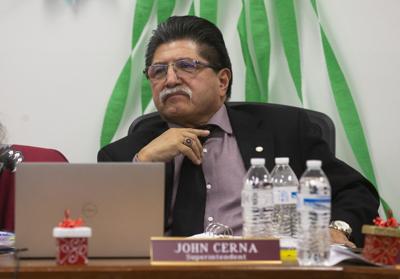
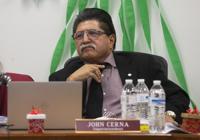

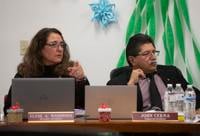

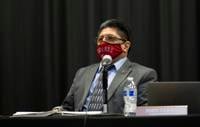

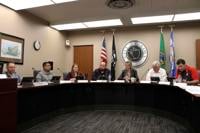

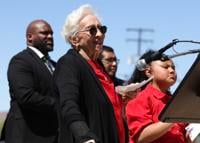


(0) comments
Comments are now closed on this article.
Comments can only be made on article within the first 3 days of publication.